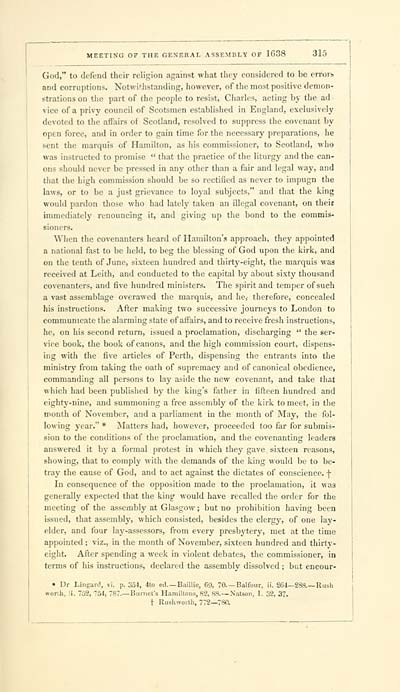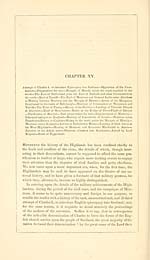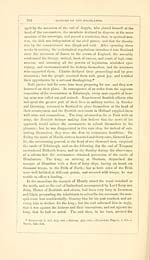Download files
Complete book:
Individual page:
Thumbnail gallery: Grid view | List view

MEETING 07 THE GENERAL ASSEMnLTt OF 1638 315
God," to defend their religion against what tliey considered to be errors
and corruptions. NotwiUistanding, however, of the most positive demon-
strations on tlie part of the people to resist, Charles, acting by the ad ■
vice of a privy council of Scotsmen establislied in England, exclusively
devoted to the affairs of Scotland, resolved to suppress the covenant by
open force, and in order to gain time for the necessary preparations, he
sent the marquis of Hamilton, as his commissioner, to Scotland, who
was instructed to promise " tliat tlie practice of the liturgy and the can-
ons sliouhl never be pressed in any other than a fair and legal way, and
tliat the high commission should be so rectified as never to impugn the
laws, or to be a just grievance to loyal subjects," and that the king
would pardon those who had lately taken an illegal covenant, on their
immediately renouncing it, and giving up the bond to the commis-
sioners.
When the covenanters heard of Hamilton's approach, they appointed
a national fast to be held, to beg the blessing of God upon the kirk, and
on the tenth of June, sixteen hundred and thirty-eight, the marquis was
received at Leith, and conducted to the capital by about sixty thousand
covenanters, and five hundred ministers. The spirit and temper of such
a vast assemblage overawed the marquis, and he, therefore, concealed
his instructions. After making two successive journeys to London to
communicate (he alarming state of affairs, and to receive fresh instructions,
he, on his second return, issued a proclamation, discharging " the ser-
vice book, the book of canons, and the high commission court, dispens-
ing with the five articles of Perth, dispensing the entrants into tlie
ministry from taking the oath of supremacy and of canonical obedience,
commanding all persons to lay aside the new covenant, and take that
which had been publislicd by the king's father in fifteen hundred and
eighty-nine, and summoning a free assembly of the kirk to meet, in the
month of November, and a parliament in the month of May, the fol-
loM'ing year." * Matters had, however, proceeded too far for submis-
sion to the conditions of the proclamation, and the covenanting leaders
answered it by a formal protest in which tliey gave sixteen reasons,
showing, that to comply with the demands of the king would be to be-
tray the cause of God, and to act against the dictates of conscience, f
In consequence of the opposition made to the proclamation, it was
generally expected that the king would have recalled the order for the
meeting of the assembly at Glasgow ; but no prohibition having been
issued, that assembly, which consisted, besides the clergy, of one lay-
elder, and four lay-assessors, from every presbytery, met at the time
appointed ; viz., in the month of November, sixteen hundred and thirty-
eight. After spending a week in violent debates, the commissioner, in
terms of his instructions, declared the assembly dissolved ; but encour-
• Dr Lingard, vi. p. 354, 4to ed.— Baillie, 69, 70. — Balfour, ii. 264— 888.— Rush
worth, ii. 752, 751, 787.— Burnet's Hamiltons, 82, 83. — Natson, I. 32, 37.
t Rushvvorth, 772— 78a
God," to defend their religion against what tliey considered to be errors
and corruptions. NotwiUistanding, however, of the most positive demon-
strations on tlie part of the people to resist, Charles, acting by the ad ■
vice of a privy council of Scotsmen establislied in England, exclusively
devoted to the affairs of Scotland, resolved to suppress the covenant by
open force, and in order to gain time for the necessary preparations, he
sent the marquis of Hamilton, as his commissioner, to Scotland, who
was instructed to promise " tliat tlie practice of the liturgy and the can-
ons sliouhl never be pressed in any other than a fair and legal way, and
tliat the high commission should be so rectified as never to impugn the
laws, or to be a just grievance to loyal subjects," and that the king
would pardon those who had lately taken an illegal covenant, on their
immediately renouncing it, and giving up the bond to the commis-
sioners.
When the covenanters heard of Hamilton's approach, they appointed
a national fast to be held, to beg the blessing of God upon the kirk, and
on the tenth of June, sixteen hundred and thirty-eight, the marquis was
received at Leith, and conducted to the capital by about sixty thousand
covenanters, and five hundred ministers. The spirit and temper of such
a vast assemblage overawed the marquis, and he, therefore, concealed
his instructions. After making two successive journeys to London to
communicate (he alarming state of affairs, and to receive fresh instructions,
he, on his second return, issued a proclamation, discharging " the ser-
vice book, the book of canons, and the high commission court, dispens-
ing with the five articles of Perth, dispensing the entrants into tlie
ministry from taking the oath of supremacy and of canonical obedience,
commanding all persons to lay aside the new covenant, and take that
which had been publislicd by the king's father in fifteen hundred and
eighty-nine, and summoning a free assembly of the kirk to meet, in the
month of November, and a parliament in the month of May, the fol-
loM'ing year." * Matters had, however, proceeded too far for submis-
sion to the conditions of the proclamation, and the covenanting leaders
answered it by a formal protest in which tliey gave sixteen reasons,
showing, that to comply with the demands of the king would be to be-
tray the cause of God, and to act against the dictates of conscience, f
In consequence of the opposition made to the proclamation, it was
generally expected that the king would have recalled the order for the
meeting of the assembly at Glasgow ; but no prohibition having been
issued, that assembly, which consisted, besides the clergy, of one lay-
elder, and four lay-assessors, from every presbytery, met at the time
appointed ; viz., in the month of November, sixteen hundred and thirty-
eight. After spending a week in violent debates, the commissioner, in
terms of his instructions, declared the assembly dissolved ; but encour-
• Dr Lingard, vi. p. 354, 4to ed.— Baillie, 69, 70. — Balfour, ii. 264— 888.— Rush
worth, ii. 752, 751, 787.— Burnet's Hamiltons, 82, 83. — Natson, I. 32, 37.
t Rushvvorth, 772— 78a
Set display mode to: Large image | Transcription
Images and transcriptions on this page, including medium image downloads, may be used under the Creative Commons Attribution 4.0 International Licence unless otherwise stated. ![]()
| Early Gaelic Book Collections > Ossian Collection > History of the Highlands and of the Highland clans > Volume 1 > (429) |
|---|
| Permanent URL | https://digital.nls.uk/79677745 |
|---|
| Description | Vol. I. |
|---|---|
| Shelfmark | Oss.247 |
| Additional NLS resources: | |
| Attribution and copyright: |
|
| Description | Selected books from the Ossian Collection of 327 volumes, originally assembled by J. Norman Methven of Perth. Different editions and translations of James MacPherson's epic poem 'Ossian', some with a map of the 'Kingdom of Connor'. Also secondary material relating to Ossianic poetry and the Ossian controversy. |
|---|
| Description | Selected items from five 'Special and Named Printed Collections'. Includes books in Gaelic and other Celtic languages, works about the Gaels, their languages, literature, culture and history. |
|---|

